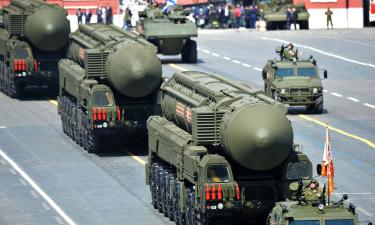What's the Fate of Russia's Electricity Tariffs?
It is reported that in general the Russian communal and housing economy is 80 per cent ready for winter. This information is highly incredible
Recently, the government has reported on preparations of the communal economy for the forthcoming heating season almost every day. According to Prime Minister Mikhail Kasyanov, the readiness of the communal and housing economy is 5-6 per cent better than in 2002. Last winter, 39 regions of Russia froze. Thus, if the government reports the level of preparation for this year we can conclued the regions of the country will suffer from poor heating this winter.
It is reported that in general the Russian communal and housing economy is 80 per cent ready for winter. In fact, this information is highly incredible. Deputy Chairman of the Duma Property Committee Nikolay Arefyev thinks this percentage is impossible as two thirds of the communal economy of the country is in a poor state of repair. Even the State Construction Committee itself names about ten regions of Russia where the situation is close to catastrophic. And these are not just Sakhalin and Chita (the northern parts of the country that traditionally experience problems with heating), but even the Ulyanovsk and Astrakhan Regions.
The situation is quite understandable in fact. Most of the spending concerning Russia's notorious housing and communal economy is shifted onto the shoulders of the regional budgets. Head of the State Construction Committee Nikolay Koshman had a tele-conference call with regional authorities; during the call Nikolay Koshman strongly criticized the work of the Russian Communal Systems, established this year and facing its first winter. He adds that governors shouldn't have got mixed up with this company. This sounds strange as the communal company is a subsidiary of RAO UES of Russia and must be controlled by the government.
On the other hand, reforming of RAO UES of Russia and increase of the railway tariffs resulted in doubling of the price for fuel for boiling plants. This consequently resulted in an increase of the rent and of the rent payment arrears. That is why the sums the communal sector has received a quarter less than usual. This is incredible but communal and housing economies of some of the Russian regions have not received financing for more than three years. But the authorities often don't care about the financing problem: indeed, it's easier to carry out the bankruptcy procedure at the enterprise and close it. Instead, new companies may be created while people of the closed communal company make attempts to attain their wages through acourt. And this is not ruled out that the situation may become even worse.
The other day former assistant of the prime minister Mikhail Delyagin has informed that starting with October 1 electric power tariffs will increase 2.9 times in some of the regions. And this is at the time when the officially announced increase of the price for electricity is just 30 per cent. Mikhail Delyagin is hardly likely to be mistaken as he sees the situation perfectly well.
In Russia's Sakhalin, the electric energy value is almost 10 times higher than the release price. The increase of the electricity price three times will mean failure of not only the communal and housing economy but the whole of Russia's industry.
Head of the Federal Energy Commission Georgy Kutovoi says that the price increase that is to come into effect starting with October 1 is not the limit at all. "The country must switch to an energetically grounded tariff. It will make up about 1.8-2 rubles. Now the average price for electricity paid in Russia is one ruble." It is supposed that families with small budgets will have to pay a privileged tariff that is to make up 50 per cent of the regular electricity tariff. If the electricity tariff is to go up it also means that prices for other goods will increase as well. Who is to compensate for this increase?
On the other hand, starting with October, 15 per cent of electricity will be sold on the free market. The head of the Federal Energy Commission says that the price for electricity on the free marker will be even lower than the fixed tariff. He adds: "What is more, in the course of time 90-95 per cent of electric energy will be sold on the free market. This must be done within the nearest 2-3 years."
But the prime cost of electricity at nuclear, hydro- and coal-burning power plants differs several times. It means that either coal enterprises will be closed because of severe competition (this means that whole regions of Russia where one kilowatt of electricity have very high prime cost will be blacked out). Or the minimal electricity price will go up to the highest possible mark. In any case, contrary to all forecasts, this will result in increase of the tariffs.
Subscribe to Pravda.Ru Telegram channel, Facebook, RSS!





